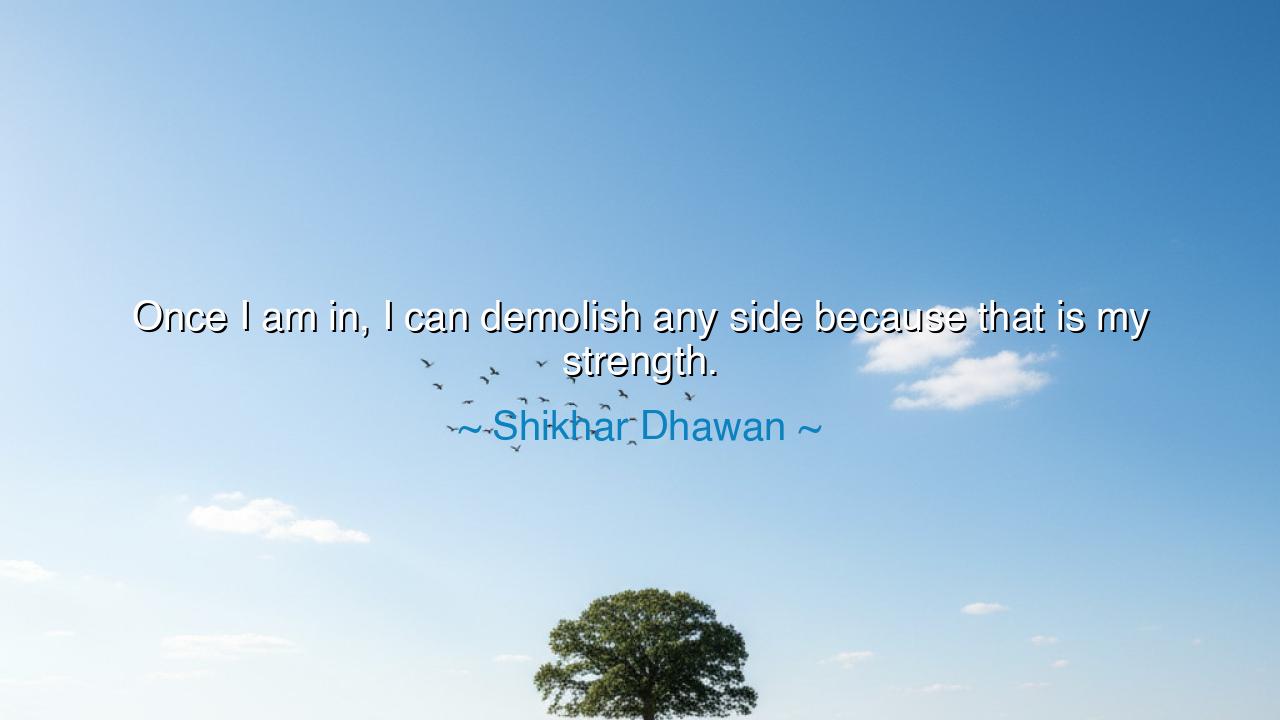
Once I am in, I can demolish any side because that is my






Hear, O seekers of mastery, the bold words of the warrior of the bat, Shikhar Dhawan, who declared: “Once I am in, I can demolish any side because that is my strength.” At first, these words resound as the boast of a cricketer, fierce with confidence. Yet beneath them lies a principle as old as battle and as eternal as perseverance: the truth that once the spirit endures the opening struggle, it gathers momentum, and no force can withstand its rising power.
For in cricket, as in life, the first moments are the hardest. The bowler is fresh, the ball is sharp, the fielders circle like wolves. In such an hour, patience is tested, discipline is demanded, and the faint-hearted are swiftly cast aside. But if the batsman endures—if he finds his rhythm, if he stands unshaken—the game bends to his will. This is what Dhawan means: once he is “in,” once he has weathered the storm, his strength shines forth not merely as survival, but as demolition, the transformation of defense into overwhelming attack.
This lesson echoes through the stories of ages. Consider Alexander the Great at the Battle of Gaugamela. At the beginning, he was surrounded by foes many times greater than his own army. The first test was to endure the charge, to hold formation while chaos thundered around. But once his men were “in”—once they had held their ground long enough to find the weakness in the enemy lines—Alexander unleashed his cavalry, demolishing a force that had seemed unbreakable. His strength lay not in reckless assault, but in surviving the opening storm and then striking with precision and power.
So too in the world of invention, recall Thomas Edison, who endured countless failures in his search for the electric light. Each attempt was like the testing overs of a match—filled with doubt, with mistakes, with the pressure of eyes upon him. Yet once he broke through, once he was “in,” the light he birthed demolished the darkness of ignorance, illuminating cities across the earth. His strength, like Dhawan’s, was not only in brilliance, but in endurance that prepared him for overwhelming triumph.
O listeners, learn this truth: the first struggle is always the hardest. Whether in sport, in battle, in art, or in life, the opening trials will press upon you with weight and fury. Many fall at this stage, thinking the storm will last forever. But to those who endure, who dig their heels into the soil and refuse surrender, there comes a moment of shift. The balance tilts, confidence rises, and what was once impossible becomes inevitable. This is the mystery of strength revealed through perseverance.
Let this lesson be your guide: when you face a new challenge, do not despair at the difficulty of its beginning. Do not mistake the opening pressure for defeat. Hold steady, find your rhythm, and let endurance lead you to mastery. Once you are “in,” once you have passed the testing fire, your strength will multiply, and you too will find the power to demolish any side—not with arrogance, but with the rightful confidence of one who has endured.
Practical is this counsel: in your daily life, commit to perseverance. Do not flee at the first resistance. Persist in your studies, endure the early failures of your craft, bear the weight of discipline when enthusiasm wanes. Each step strengthens you until the moment comes when you are no longer merely surviving—you are commanding. And then, like Dhawan at the crease, you will discover that nothing can withstand the force of your fully awakened strength.
Thus remember the words of Shikhar Dhawan: “Once I am in, I can demolish any side because that is my strength.” They are more than a cricketer’s boast; they are a parable for life. Strength is not born in ease but in endurance, and once it is awakened, it turns survival into victory, and struggle into triumph.






AAdministratorAdministrator
Welcome, honored guests. Please leave a comment, we will respond soon